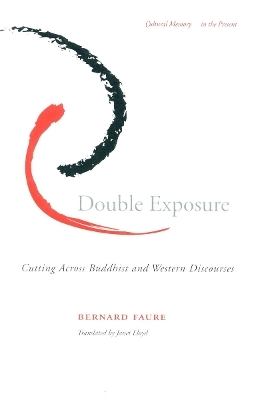
Double Exposure
Cutting Across Buddhist and Western Discourses
Seiten
2003
Stanford University Press (Verlag)
978-0-8047-4348-8 (ISBN)
Stanford University Press (Verlag)
978-0-8047-4348-8 (ISBN)
This book explores the possible relations between Western types of rationality and Buddhism. It also examines some cliches about Buddhism and questions the old antinomies of Western culture ("faith and reason," or "idealism and materialism").
This book explores the possible relations between Western types of rationality and Buddhism. It also examines some clichés about Buddhism and questions the old antinomies of Western culture ("faith and reason," or "idealism and materialism"). The use of the Buddhist notion of the Two Truths as a hermeneutic device leads to a double or multiple exposure that will call into question our mental habits and force us to ask questions differently, to think "in a new key."
Double Exposure is somewhat of an oddity. Written by a specialist for nonspecialists, it is not a book of vulgarization. Although it aims at a better integration of Western and Buddhist thought, it is not an exercise in comparative philosophy or religion. It is neither a contribution to Buddhist scholarship in the narrow sense, nor a contribution to some vague Western "spirituality." Cutting across traditional disciplines and blurring established genres, it provides a leisurely but deeply insightful stroll through philosophical and literary texts, dreams, poetry, and paradoxes.
This book explores the possible relations between Western types of rationality and Buddhism. It also examines some clichés about Buddhism and questions the old antinomies of Western culture ("faith and reason," or "idealism and materialism"). The use of the Buddhist notion of the Two Truths as a hermeneutic device leads to a double or multiple exposure that will call into question our mental habits and force us to ask questions differently, to think "in a new key."
Double Exposure is somewhat of an oddity. Written by a specialist for nonspecialists, it is not a book of vulgarization. Although it aims at a better integration of Western and Buddhist thought, it is not an exercise in comparative philosophy or religion. It is neither a contribution to Buddhist scholarship in the narrow sense, nor a contribution to some vague Western "spirituality." Cutting across traditional disciplines and blurring established genres, it provides a leisurely but deeply insightful stroll through philosophical and literary texts, dreams, poetry, and paradoxes.
Bernard Faure is George Edwin Burnell Professor of Religious Studies at Stanford University. He is the author, most recently, of The Will to Orthodoxy: A Critical Genealogy of Northern Chan Buddhism (Stanford1997).
| Erscheint lt. Verlag | 10.11.2003 |
|---|---|
| Reihe/Serie | Cultural Memory in the Present |
| Übersetzer | Janet Lloyd |
| Verlagsort | Palo Alto |
| Sprache | englisch |
| Maße | 152 x 229 mm |
| Gewicht | 308 g |
| Themenwelt | Geisteswissenschaften ► Philosophie ► Geschichte der Philosophie |
| Geisteswissenschaften ► Philosophie ► Philosophie der Neuzeit | |
| Geisteswissenschaften ► Religion / Theologie ► Buddhismus | |
| ISBN-10 | 0-8047-4348-7 / 0804743487 |
| ISBN-13 | 978-0-8047-4348-8 / 9780804743488 |
| Zustand | Neuware |
| Haben Sie eine Frage zum Produkt? |
Mehr entdecken
aus dem Bereich
aus dem Bereich
die kolonialen Wurzeln der französischen Theorie
Buch | Hardcover (2024)
Matthes & Seitz Berlin (Verlag)
CHF 41,90
eine Geschichte der Philosophie 4
Buch | Hardcover (2022)
Goldmann (Verlag)
CHF 37,90
Auf dem Weg zu einer Kultur der Bewusstheit | Mit mehr als 500 …
Buch | Hardcover (2023)
Berlin Verlag
CHF 58,90


